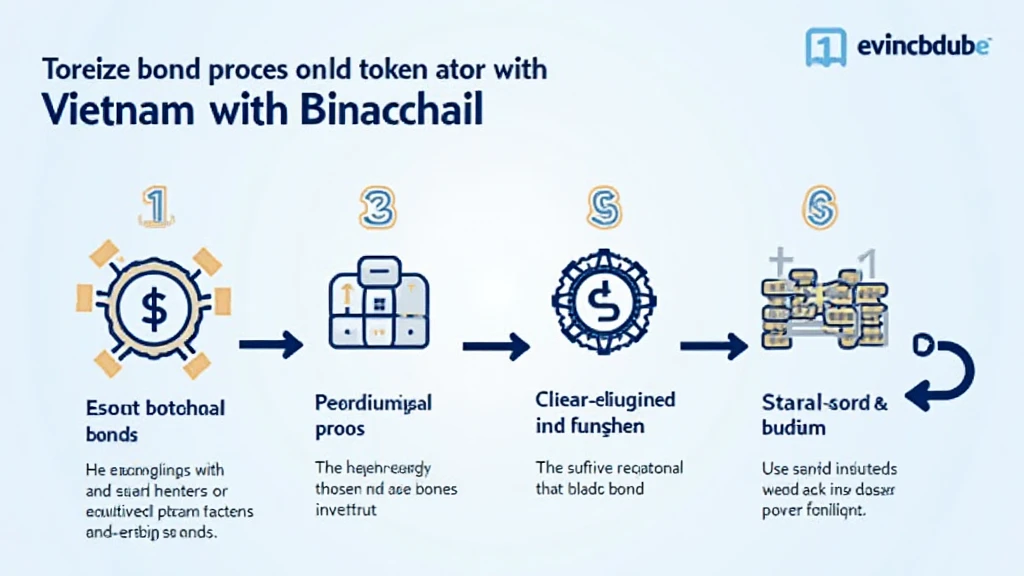How to tokenize bonds in Vietnam: A step-by-step guide
With the global bond market valued at over $128 trillion, Vietnam is emerging as a significant player in blockchain adoption. The goal of tokenizing bonds is to increase liquidity, reduce costs, and enhance transparency in financial markets. In this article, we’ll explore how to tokenize bonds in Vietnam and the broader implications for the financial landscape.
The Importance of Tokenization in Vietnam
Tokenization represents the cutting-edge of digital finance. For a country like Vietnam, which is experiencing rapid economic growth, leveraging blockchain as a financial infrastructure can offer numerous advantages:
- Increased Liquidity: Tokenized bonds can be traded 24/7 in a decentralized market, something traditional bond markets can’t offer.
- Lower Costs: Tokenization can reduce administrative costs related to bond issuance and trading.
- Transparency and Security: Utilizing blockchain enhances security and provides a clear audit trail, a concept known as tiêu chuẩn an ninh blockchain.
Understanding the Mechanics of Tokenization
Tokenization is the process of converting rights and ownership details about an asset into a digital token on a blockchain platform.

How does tokenization work?
Consider a traditional bond, which represents a loan made by an investor to a borrower. In tokenizing this bond, the following steps are typically taken:
- Asset Identification: Identify the bond to be tokenized, including its underlying rights and payments.
- Smart Contracts: Use smart contracts to automate the execution of terms related to the bond.
- Issuance of Tokens: Issue tokens that represent ownership of the bond on a blockchain.
- Secondary Market Trading: Facilitate trading of these tokens on secondary markets, increasing liquidity.
Market Overview: Vietnam’s Potential for Tokenized Bonds
According to recent reports, Vietnam’s bond market has shown significant promise, growing annually at rates exceeding 20%. This rapid growth indicates a demand for innovative financing methods like tokenization.
As more Vietnamese users adopt digital currencies and blockchain technology, the potential for tokenized bonds becomes increasingly apparent. Notably, the Vietnamese government is already exploring regulations that could facilitate the adoption of such innovations.
Steps to Tokenize Bonds in Vietnam
1. Legal Framework and Compliance
Before proceeding, it’s crucial to navigate the legal landscape effectively. Engage with local regulators to ensure compliance with pertinent laws.
- Eligibility of assets for tokenization
- Requirements for issuance and trading
2. Choose the Right Blockchain Platform
Select a blockchain that aligns with your needs, considering factors such as transaction speed, fees, and security features. Ethereum, with its robust smart contract capabilities, is a popular choice.
3. Develop Smart Contracts
Create smart contracts that will govern the rights and obligations associated with the bond. This is vital for automating processes like coupon payments.
4. Token Issuance and Distribution
Once smart contracts are established, proceed to issue tokens representing the bond. Ensure that distribution channels are prepared for potential investors.
5. Promote in Secondary Markets
For liquidity, promote the tokens on secondary markets. Collaboration with existing digital asset exchanges can enhance visibility and accessibility.
Challenges in Tokenization
Despite the advantages, several challenges exist:
- Regulatory Uncertainty: Governments globally are still defining how to treat tokenized assets, including bonds.
- Market Acceptance: Traditional investors may be hesitant to embrace tokenized assets without education on their benefits.
Future Trends in Bond Tokenization
Looking toward 2025, we can expect advancements in tokenization technology, improved regulatory clarity, and enhanced adoption by investors. The demographic shift in Vietnam towards digital natives will likely drive interest.
Emerging Technologies
Here’s what you can look forward to:
- Integration of AI: AI can optimize trading and enhance security protocols.
- Increased Interoperability: Token standards may evolve, allowing for seamless trading across multiple platforms.
Conclusion: Moving Forward with Tokenized Bonds in Vietnam
Tokenizing bonds in Vietnam not only aligns with global financial trends but also supports the country’s economic growth. By embracing blockchain technology, Vietnam can modernize its financial system and improve accessibility for investors.
For more on how to navigate this evolving landscape, visit officialcryptonews. Stay informed as we bring you the latest news and insights about blockchain and digital assets.
Remember, while the potential is exciting, always consult with local experts and regulators to avoid pitfalls in this new frontier.




